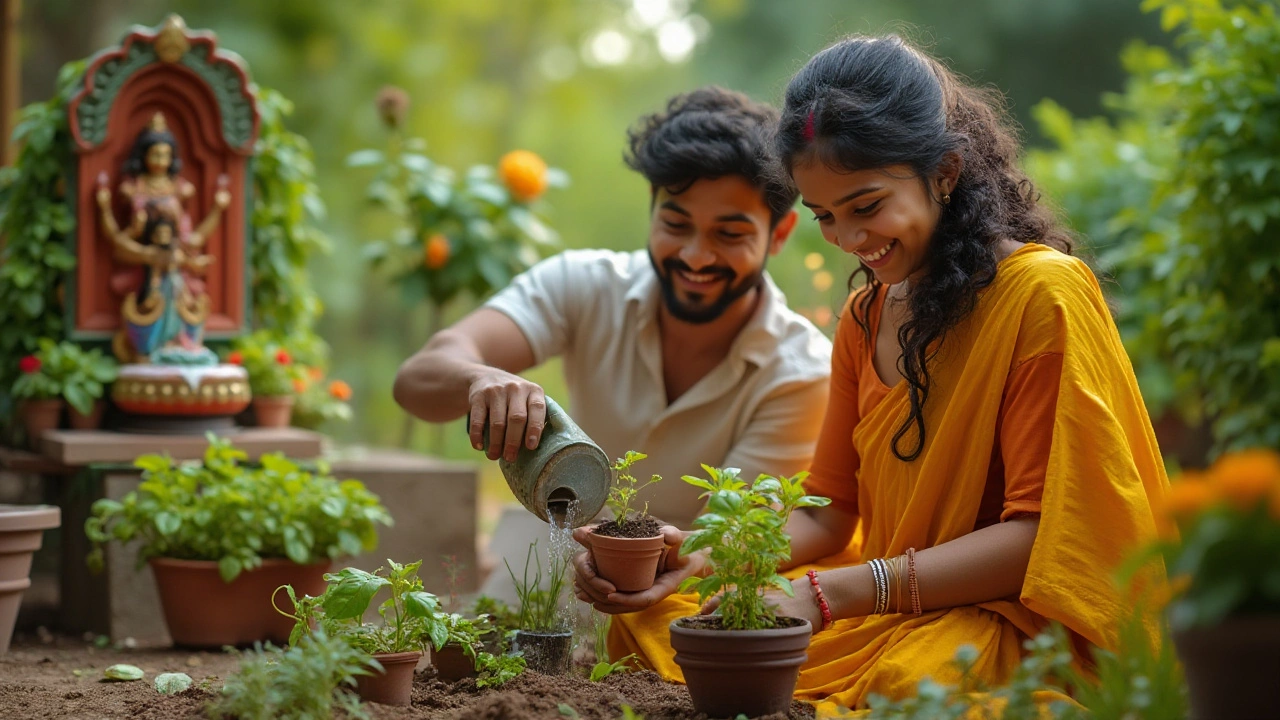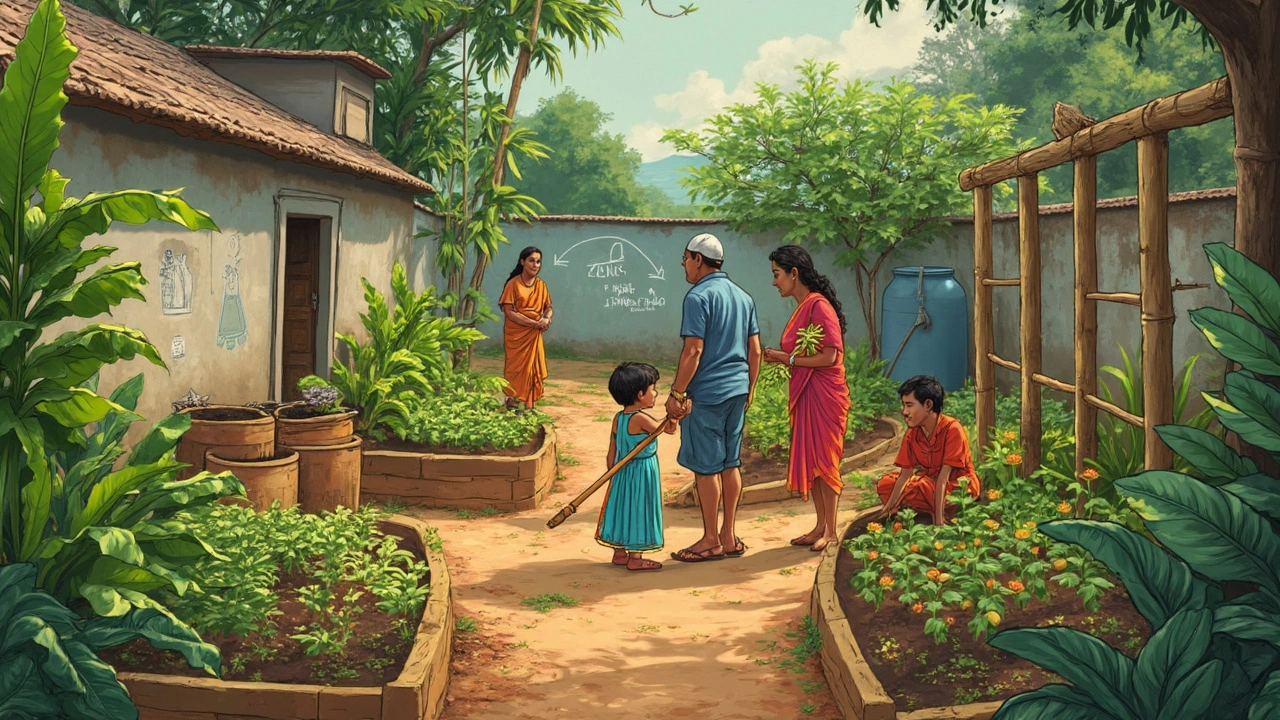Discovering Hindu Deities: Gods of Gardening and Fertility

Hindu mythology is rich with deities that symbolize various aspects of life and nature, and this includes the nurturing realm of gardening. While there's no singular Hindu god exclusively for gardening, the domain is under the influence of gods associated with fertility, agriculture, and the flourishing of life. These celestial figures are not just spiritual icons; they embody principles and practices that are deeply intertwined with how gardening is perceived and done, especially in the vibrant context of India.
In Indian culture, where the soil is revered and every seed has a story, gods play an integral role in echoing these values. These myths and legends aren't just for telling. They hold practical insights for gardeners seeking abundant growth. Through the synergy of divine wisdom and earthly knowledge, one can unlock the secrets of a thriving vegetable garden. Let's explore how these elements come together to inform and inspire your gardening journey.
- Introduction to Hindu Gardening Deities
- Cultural Significance in India
- Honoring Deities in Garden Practices
- Practical Gardening Tips and Insights
Introduction to Hindu Gardening Deities
In the rich tapestry of Hindu mythological narratives, nature and the divine are deeply intertwined, with many gods and goddesses embodying the forces of nature, cultivating a unique relationship with gardening and agriculture. While there isn't a single deity dedicated solely to the practice of gardening, several Hindu deities are revered for their association with fertility, the earth, and the prosperity of vegetation. This connection highlights the spiritual significance that these deities hold for those engaged in Indian vegetable gardens.
One prominent figure is Lord Vishnu, who is regarded as the preserver and protector of the universe. His avatars, particularly Krishna, are often depicted frolicking in lush gardens. Krishna's gardens in Vrindavan, filled with flowers and fruits, symbolize the harmony between spiritual growth and nature's bounty. Similarly, Goddess Lakshmi, the consort of Vishnu, is often represented with lotus flowers and grains, embodying abundance and fertility, essential qualities for fruitful gardening.
Another significant deity is Lord Shiva, known for his connection to the natural world and its cycles. Worshipped on the top of Mount Kailash, Shiva is surrounded by pristine nature, serving as a reminder of the symbiotic relationship between divinity and the earth. His influence on planting cycles and agriculture is noteworthy among devotees seeking blessings for a prosperous harvest.
"The ancient hymns of the Rigveda extol the earth deities, addressing them as nurturing mothers to all life forms. Their blessings are sought for growth and replenishment of the land," notes Dr. Anuradha Gupta, a well-known scholar on Indian mythology.
Moreover, Goddess Parvati, as Gauri, is revered as the manifestation of green and growing life, and her blessings are sought for the fertility of the land. In regions where agriculture is a way of life, rituals often invoke these deities to ensure balance and productivity. Understanding and honoring these deities in the context of gardening connects one's cultivation endeavors with deeper cultural traditions.
These gods and goddesses, through their stories and symbols, impart practices that can improve personal gardening techniques. They stress the importance of respecting natural elements and adhering to rhythms that have been preserved over centuries. This harmony between divine respect and pragmatic farming is not just a routine but an art that continuously evolves while maintaining its roots in age-old beliefs. In embracing these deities, Indian gardeners find not only inspiration but also practical guidance in creating thriving and sustainable gardens.

Cultural Significance in India
In the tapestry of Indian culture, gardening is far more than a pastime; it is a profound way of life interwoven with spiritual undertones. The practice of cultivating plants holds a revered place in society, melded with traditions, festivals, and ecological wisdom passed down through generations. Every vibrant tulsi plant on a doorstep or thriving sack of vegetables in the backyard is not just about sustenance—it's an extension of familial heritage and divinity.
Gardens in India are often considered sacred spaces. They serve not only aesthetic or culinary purposes but spiritual ones too. Many Indian homes have a sacred plant corner, where plants such as tulsi (holy basil) or neem are grown. These plants are imbued with both medicinal properties and religious importance. Tulsi, for instance, is believed to embody goddess Lakshmi and plays a crucial role in rituals and sacrifices. Homes with these plants often enjoy a perception of purity and positivity, believed to attract prosperity and peace.
Gardening is also entrenched in the cyclical rhythms of festivals and seasonal changes. Each festival, particularly those harvest-oriented like Pongal and Makar Sankranti, is a reminder of nature's bounty and mankind's gratitude. During the festival of Pongal, for instance, farmers show gratitude to the Sun God for a bountiful harvest by boiling the first harvest of rice ceremoniously. The significance of this act reverberates in neighborhoods and villages, uniting communities through the shared respect for the earth's gifts.
Educationally, gardens in India are seen as living classrooms where traditional wisdom meets practical learning. Elders often pass down gardening methods and environmental knowledge to the younger generations, ensuring a continuity of both skill and intimacy with nature. This transmission of knowledge is frayed with stories of gods and sacred legends, where children learn that the ground they tread on is as revered as the heavens above.
"Gardening is a very personal experience, and in India, it often involves the full family, from the children to the grandparents, sharing tasks and stories," notes Dr. Vasudevan Nair, an expert on Indian agricultural traditions, highlighting how this practice fosters interpersonal bonding amid family units.
Present-day initiatives align with these ancient tenets, contributing to a resurgence of gardening enthusiasm among urban dwellers. While India progresses technologically, there is a burgeoning movement towards green spaces within cityscapes, echoing the gardens of ancient societies in a modern context. With increasing concerns about air quality and food safety, urban gardening has emerged as a crucial lifestyle choice. Communities are coming together to cultivate community gardens, drawing upon the ancient spirit of shared land and collective benefit.

Honoring Deities in Garden Practices
Incorporating spirituality into gardening isn’t just about paying homage to the godly patrons of nature but is also about creating a harmonious balance between human efforts and divine blessings. Gardening deities in Hinduism offer a unique blend of inspiration and reverence, as practices involve rituals and mindfulness that honor these celestial beings. Many Indian gardeners often start their planting season with a puja, a ritualistic prayer dedicated to gods like Vishnu, who is known for his role in sustaining life, or Parvati, a symbol of fertility and devotion. These deities are believed to energize the plants, promising lush growth and a bountiful harvest.
The process often includes offerings of water, flowers, and incense at small altars situated in or near the garden.
"The very presence of these symbolic gestures reminds us that our gardens are more than just landscapes; they are living temples," suggests Dr. Suresh Nanda, a famous scholar in Hindu traditions.By viewing gardening as a sacred act, we heighten the sense of care and responsibility for the land. This practice echoes the ancient Vedic belief that the earth is our mother, urging adherence to practices that nourish rather than exploit.
Another beautiful tradition is aligning the garden layout according to Vastu Shastra, the traditional Indian system of architecture which harmonizes with natural forces, often considering the positioning relative to the sun and auspicious directions. Implementing these practices might involve integrating water features, placing certain plants in cardinal directions, and even choosing specific days for planting or reaping. Such customs aren't merely spiritual; they embed a level of meticulous planning and respect for the environment, which modern gardening science supports as beneficial.
In northern parts of India, celebrations like Makar Sankranti are dedicated to the sun god Surya and coincide with the beginning of the harvest season. During these times, farmers and gardeners pay tribute by lighting diyas (small oil lamps) in the fields. This act symbolizes the removal of darkness and ignorance, allowing an abundance of energy to nourish their crops. These rituals highlight the intrinsic relationship between Hindu traditions and Indian vegetable garden practices. The more we delve into these means of reverence, the more we find that there is a profound understanding of sustainability and an unspoken contract between the earth and its caretakers.
With practices steeped in deep cultural history, gardens in India become more than spaces for plants; they become sanctuaries for peace, reflection, and community. Although these rituals may evolve with each generation, their core essence of honoring nature and its deities remains a timeless guide. Exploring these practices not only enriches our gardens but also our connection to the roots of our spirituality and our role as custodians of this planet.

Practical Gardening Tips and Insights
To cultivate a flourishing vegetable garden that respects both tradition and modern-day gardening wisdom, it's essential to blend spiritual insights with practical techniques. Recognizing the influence of Hindu gods associated with fertility and growth helps confer balance and prosperity upon your vegetable garden. Rich in biodiversity, Indian gardens are a testament to centuries-old practices that blend sacred rituals with earth's bounty. For any gardener, this fusion can unlock a myriad of benefits.
Understanding soil is critical. In India, soil is revered, often considered a manifestation of the divine. It's not just dirt; it's the very canvas upon which life paints its dance. Ensuring your soil is rich in nutrients and well-aerated is essential. Start by conducting a simple soil test to determine its pH level and nutrient content. Based on this, amend it with organic matter such as compost or manure, which echoes the natural fertility principles embraced by the ancients. It provides plants with crucial nutrients and improves soil structure, aiding in water retention and root development.
Watering practices are equally significant. Just as Hindu rituals sometimes entail the careful use of water in ceremonial baths, so too should gardeners be judicious with their watering techniques. Early morning is the best time to water your plants since evaporation rates are lower, minimizing water loss and ensuring optimal hydration. Avoid watering in the heat of midday, which can lead to leaf scorch and inefficient usage. Consider implementing a drip irrigation system, which emulates the gentle, life-sustaining rain attributed to divine grace, delivering water directly to plant roots with precision and minimal waste.
Companion planting, an age-old aspect of Indian gardening, mirrors the myths where gods coexist in harmony. By strategically planting vegetables that benefit each other, like tomatoes with basil, you can naturally ward off pests and boost growth. This practice improves biodiversity and soil health, reflecting the interconnected ecology revered in ancient texts. Moreover, incorporating these diverse species mimics the natural world’s resilience, as seen in sacred groves where trees and flora live symbiotically.
Lastly, embracing local biodiversity is vital. India's diverse climate supports a wide range of vegetable varieties, many with sacred connotations. Opt for traditional varieties of vegetables that are adapted to your specific climate and soil conditions. Not only do these varieties often require fewer inputs like fertilizers and pesticides, they also have cultural and nutritional benefits. Utilizing seeds and plants native to your region is a nod to the heritage of Hindu agriculture, where harmony with nature is key. As the Vedic scriptures suggest, understanding and working with the natural cycles of life ensures bountiful harvests.





